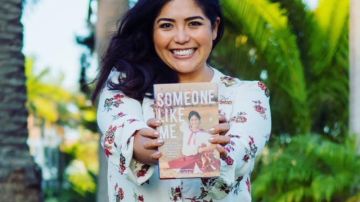Julissa Arce’s Wants Her Story To Inspire Undocumented Youth To Dream Big
There are a lot of ways to describe Julissa Arce

Photo: Courtesy of Julissa Arce
There are a lot of ways to describe Julissa Arce. She’s a former Wall Street VP, a former undocumented person, a political commentator, a best-selling author, and a social justice advocate. But in one word, Julissa Arce is courageous. Her latest book Someone Like Me is a young adult novel that explores some of the nuances of the undocumented experience that aren’t normally talked about.
We often hear about the experience of physically crossing the border to the United States, but few talk about what it’s like being a child left behind. We barely hear about pueblos that become ghost towns when it’s residents come stateside or about the half-built luxury homes that sit empty, decaying in the sun. TBut Arce’s book is also filled with those universal experiences we all go through in our formative years, mainly Someone Like Me expresses how all-encompassing the desire to fit in is when you’re young and going through changes you can’t understand.
“[My book is about] the desire to belong, and finding yourself in a new place whether that’s a new school or a new town or a new country. I remember getting made fun of in school because my lunch smelled funny and I wish at that time I had said ‘my lunch smells bomb, your bologna sandwich is what smells.’ But I didn’t have that confidence at 12 years old,” Arce chuckled.
Someone Like Me is a rare look into the beginnings of a high achieving undocumented youth that was intentionally written for other undocumented youth. A first-hand account about what it’s like to be undocumented in a time when undocumented people are routinely caged like animals carries a powerful humanizing message. The subject matter, like the timing, is symbolic and also intentional. Arce began writing in the summer of 2017 as Trump’s hateful rhetoric continued to escalate and target immigrants.
“After the election, I was even more committed to telling my story and being more outspoken and committed to doing this work. It was so important to me that young readers in middle school and in high school see themselves reflected in a book. And to know that their stories are so important that there are books written about them and their experiences” she said.
In September Arce was invited to speak at The Economist’s Open Future Festival in New York, it was an event that received substantial backlash for inviting Steve Bannon to speak—ironically enough—about the future of Liberalism. There was an outcry from other speakers, many of which dropped out and penned op-eds about why they made that decision. But surprisingly enough Arce chose to attend not to support his presence but to defy it.
“I thought about pulling out and then I looked at it from a different point of view. I looked at the people who were going to be on the immigration panel [I was speaking on] and there was a woman from The Center For Immigration Studies, which is considered a hate group by the Southern Poverty Law Center and there was a guy who is an ally but he himself is not an immigrant. And I was like you know what, I need to be there because the only voice of someone who is an immigrant who was undocumented is my voice. Ultimately I decided that I was going to go to the conference and speak at the conference because I wanted my voice to be heard whether or not he was there,” she said.
Arce made it a point to sit front row and to challenge Bannon on his policies against the American worker, his racist attitudes, and the lies he tells about immigrants. She was the first to raise her hand when the question portion began.
“He was talking about how much he likes to read, so I was like ‘since you like to read so much I brought you a copy of my book so that you can actually learn about people like me’ and I gave him my book. I did think that for me it was important for him to know that we’re not going to back down, we’re here to stay and that my story and stories like mine are important,” Arce said.
It’s not that she believes her words changed his mind or that he’ll read her book but it’s something she says she needed to do for herself and for the voiceless undocumented youths in the US. “People like Steve Bannon want an America that doesn’t have people like me in it. I am not going to be scared or silenced by a racist and I am going to take up space—I am going to take up his space.”
Arce also highlighted the unfair position outlets like the New Yorker and The Economist put people of color in by choosing to “play devil’s advocate” or “challenge” the immobile beliefs of a racist.
“When outlets like The Economist invite people like Steve Bannon to events we have to make the very difficult choice of either removing our voices from an important conversation or sharing the stage with a bigot. There is no right answer and there is no winning in that situation. I wish more legitimate outlets would not put us in that position,” she adds.
Aside from her novels, Arce has made it a point to support and help immigrant youth navigate what she considers one of the trickiest parts of her American experience—going to college. She created the Ascend Educational Fund in order to mentor and help immigrant teens pay for college, no matter their status.
“My experience with going to college was difficult. Even after I was able to get in, I didn’t have any financial aid because undocumented students don’t qualify for the FAFSA. That’s what led me to create the Ascend Educational Fund,” she said. “I’m really proud of what we’ve been able to accomplish in six years. We’ve given almost a half a million dollars in scholarship funds to about 50 students, some of whom would have not been able to go to college otherwise.”
When I asked Arce what advice she has for the undocumented people in the US who are finding it difficult to keep going, she said: “Don’t give up! Take stock of what you’ve already accomplished and how far you’ve come. Just the fact that you are here in the country at this moment is really powerful and amazing and you just have to keep pushing forward, you can’t give up now.”
You can find more on Julissa’s book tour here, you can buy Someone Like Me here and you can follow her journey on Instagram and Twitter.

















